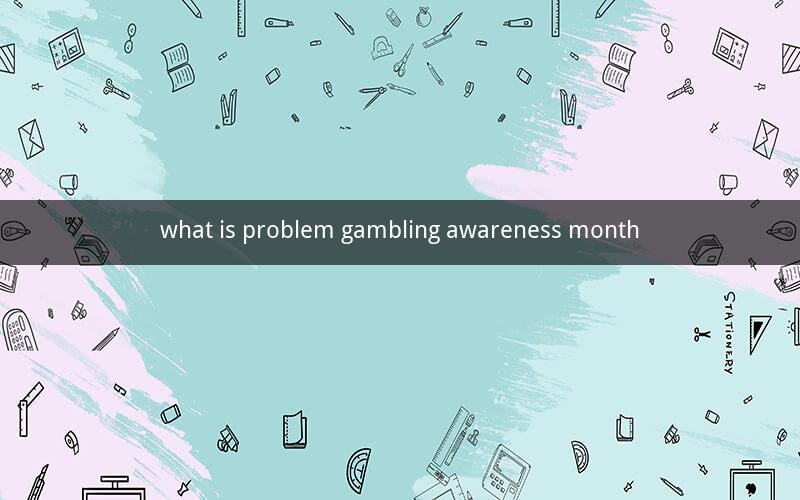
Table of Contents
1. Introduction to Problem Gambling Awareness Month
2. The Importance of Raising Awareness
3. Understanding Problem Gambling
4. Recognizing the Signs of Problem Gambling
5. The Impact of Problem Gambling on Individuals and Society
6. Prevention and Treatment Options
7. The Role of Education in Problem Gambling Awareness
8. The Role of Technology in Problem Gambling Awareness
9. Success Stories and Testimonials
10. Conclusion
1. Introduction to Problem Gambling Awareness Month
Problem Gambling Awareness Month is a global initiative aimed at increasing public awareness about problem gambling and its effects on individuals, families, and communities. Held annually in March, this month-long event serves as a platform for advocacy, education, and support for those affected by problem gambling.
2. The Importance of Raising Awareness
Raising awareness about problem gambling is crucial for several reasons. Firstly, it helps individuals recognize the signs and symptoms of problem gambling and seek help before the situation worsens. Secondly, it promotes understanding and empathy towards those struggling with gambling addiction, reducing the stigma associated with this condition. Lastly, increased awareness can lead to better prevention and treatment strategies, ultimately saving lives.
3. Understanding Problem Gambling
Problem gambling refers to a pattern of gambling that leads to significant harm or distress. This can include financial, social, emotional, or legal consequences. Problem gambling is characterized by an inability to control gambling behavior, even when it causes problems in one's life.
4. Recognizing the Signs of Problem Gambling
Identifying the signs of problem gambling is essential for early intervention. Some common signs include:
- Increasing the amount of money and time spent on gambling
- Borrowing money to fund gambling activities
- Feeling restless or irritable when not gambling
- Lying to family and friends about gambling habits
- Using gambling as a way to escape from problems or negative emotions
5. The Impact of Problem Gambling on Individuals and Society
Problem gambling has far-reaching consequences for individuals and society. Some of the impacts include:
- Financial ruin
- Relationship problems
- Mental health issues, such as depression and anxiety
- Legal troubles
- Decreased productivity
- Increased healthcare costs
6. Prevention and Treatment Options
Preventing and treating problem gambling involves a combination of strategies. Some effective prevention methods include:
- Education and awareness campaigns
- Responsible gambling policies
- Setting limits on gambling activities
Treatment options for problem gambling include:
- Counseling and therapy
- Support groups
- Medication
7. The Role of Education in Problem Gambling Awareness
Education plays a vital role in problem gambling awareness. By providing individuals with information about the risks and consequences of gambling, education can help prevent problem gambling and promote responsible gambling behavior.
8. The Role of Technology in Problem Gambling Awareness
Technology has the potential to significantly impact problem gambling awareness. Online resources, mobile apps, and social media platforms can be used to raise awareness, provide support, and promote responsible gambling.
9. Success Stories and Testimonials
Sharing success stories and testimonials from individuals who have overcome problem gambling can be powerful in raising awareness. These stories can inspire hope and provide a sense of community for those struggling with this condition.
10. Conclusion
Problem Gambling Awareness Month serves as an important reminder of the dangers of problem gambling and the need for ongoing education and support. By working together, we can raise awareness, prevent problem gambling, and provide help to those in need.
Questions and Answers
1. What is the main goal of Problem Gambling Awareness Month?
Answer: The main goal of Problem Gambling Awareness Month is to increase public awareness about problem gambling and its effects.
2. Who is at risk for problem gambling?
Answer: Individuals with a history of addiction, mental health issues, or family members of gamblers are at higher risk for problem gambling.
3. What are some common signs of problem gambling?
Answer: Common signs of problem gambling include increasing the amount of money and time spent on gambling, borrowing money to fund gambling activities, and feeling restless when not gambling.
4. How can education help prevent problem gambling?
Answer: Education can help prevent problem gambling by providing individuals with information about the risks and consequences of gambling, promoting responsible gambling behavior, and reducing the stigma associated with problem gambling.
5. What are some treatment options for problem gambling?
Answer: Treatment options for problem gambling include counseling and therapy, support groups, and medication.
6. How can technology be used to raise awareness about problem gambling?
Answer: Technology can be used to raise awareness about problem gambling through online resources, mobile apps, and social media platforms.
7. What role does family play in problem gambling?
Answer: Family members can play a crucial role in identifying the signs of problem gambling and providing support to those struggling with this condition.
8. How can communities support individuals with problem gambling?
Answer: Communities can support individuals with problem gambling by providing access to treatment, organizing support groups, and raising awareness about this issue.
9. Can problem gambling lead to legal troubles?
Answer: Yes, problem gambling can lead to legal troubles, such as fraud, theft, or embezzlement, as individuals may resort to illegal means to fund their gambling habits.
10. Is problem gambling a mental health issue?
Answer: Yes, problem gambling is considered a mental health issue due to its potential to cause significant harm or distress to individuals and their families.